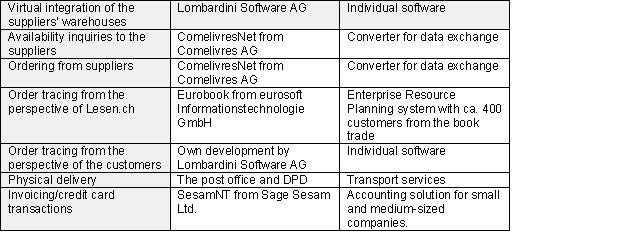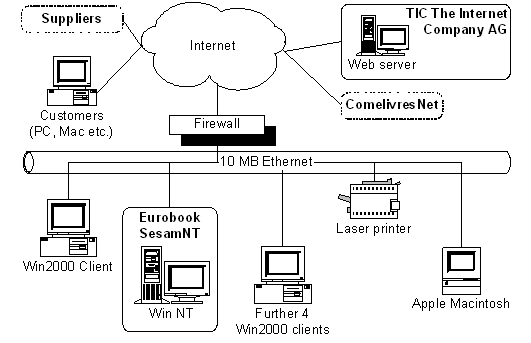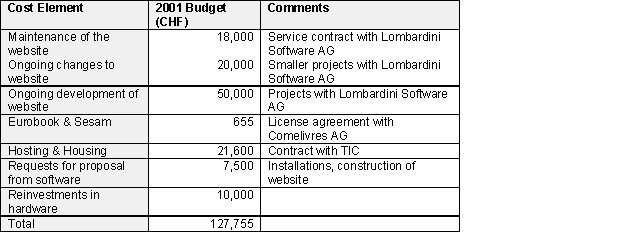E-fulfillment in the book trade at Lesen.ch
Lesen.ch is a successful, entirely virtual bookshop. The quick reaction to conditions in the market and the bold integration of various software components into a complete, company-specific solution means that Lesen.ch can provide its customers with end-to-end support. The virtual integration of its suppliers’ warehouses is the decisive aspect of fulfillment at Lesen.ch.
Table of Contents
1. The company2. E-business vision and e-business strategy
Marketing strategy, e-business concept, fulfillment partners
3. Fulfillment solution
Fulfillment process, software integration
4. Implementation
Business processes, System architecture
5. Operation
Profitability, financing, costs, turnover, revenue
6. Success factors
1. The company
Lesen.ch began selling books on 9th February 1998 as Switzerland’s first entirely virtual bookshop. Its founders, Christoph Bürgin und Armin Luginbühl, took three months to prepare for the market launch. During this time, the first website and operational plans emerged.
Background
Lesen.ch currently employs a staff of four who are principally engaged in duties connected with the book trade. Maintenance of the IT infrastructure, warehousing and transport are outsourced.
As a former executive at a leading Swiss bookseller, Christoph Bürgin decided not only to go independent but to become a virtual bookseller at the same time – principally because he considered that the adjustment to the possibilities of internet trading among traditional suppliers was taking far too long.
He risked this step, despite the fact that virtual bookshops had already been set up by companies with a great deal more financial clout. He is convinced that niche strategies are possible in the internet, too. In 2001, Lesen.ch was awarded the FDP’s top prize for SMEs in recognition of its commitment and success.
Industry, products, target groups
Lesen.ch sells books, videos, DVDs and software to end customers. This puts the company on a par with the majority of retailers in the book trade. Its lack of a physical presence means that impulse buyers, i.e. people who buy a book for reading entertainment before going on holiday, are not reached. Its strong virtual presence, by contrast, opens up various customer groups that remain inaccessible to the competition.
Like other virtual traders, Lesen.ch plays a dual role. It has rivals in both the book market and in the market for software solutions for operating sales portals.
The Swiss book market is still characterised by de-facto vertical price fixing. Thus, the end retail prices are identical at all bookshops. For years, the market has stagnated at approx. CHF 800 million. The overseas virtual book trade generates around 2.5% of this volume. Altogether, the share of virtual trading is thought to be some 15%. The market is also strongly dominated by trading at fixed locations. There, overcapacities are apparent that are leading to a process of concentration. The traditional mail-order business still represents serious competition; Lesen.ch sets itself apart from it through differentiating measures.
The market for software solutions for operating sales portals, however, is still in its pioneering phase. Above all the lack of standards in uniform design of internet business processes, coupled with the considerable need for reorganisation, mean that companies with functioning solutions are positioned to take ever-increasing advantage of business opportunities.
At night and at weekends, Lesen.ch sells mainly to private customers (B2C); during the day, its custom comes mainly from companies, institutions and administrations (B2B). Lesen.ch’s customers are definitely not bargain hunters. They are people who count on assured fulfillment at fair prices with good guidance. Despite this, Lesen.ch regularly offers special deals (e.g. five books from various Swiss authors at an attractive price). It was decided not to set up a bonus programme specially for Lesen.ch. To ensure that customers are still rewarded for buying as often as possible at Lesen.ch, a partnership was created with the Qualiflyer Programme. Interestingly, this partnership has been extremely successful. The emotional aspects of the travel-bonus programme are remarkable according to Armin Luginbühl.
Around 60% of orders originate from customers who have already bought from Lesen.ch in the past. Most orders come from Switzerland.
2. E-business vision and e-business strategy
Christoph Bürgin und Armin Luginbühl have a clear vision for Lesen.ch:
“We want to be booksellers in the ’net, not a general warehouse.”
Both believe that their concentration on the book trade will pay off, even if many other virtual traders pursue another strategy.
Strategy
An important aspect of fulfillment is that customers receive competent advice automatically and personally. Any title requested is usually available through Lesen.ch because its experts use various tools to predict demand and to instantaneously order copies from the wholesaler promising the fastest delivery.
What is important, however, is that the product book is not merely considered in its printed form. Increasingly, a book may also be a file or a CD-ROM. Lesen.ch specialises in selling content. Which format it is traded in makes no difference. New technologies are adapted as quickly as they are considered useful by customers. Thus, the Lesen.ch range changes at the same pace as the media carriers for what we today term books.
The cornerstone of marketing strategy is customer benefit. “We have never discussed whether we should include a function in the website that has been requested by our customers. We have always programmed it immediately and resolutely.” The same is true of their readiness to deliver. Despite this, people stopped believing long ago that demand can be influenced through an informed selection of particularly readable books.
The provider’s e-business concept
The web strategy in force at Lesen.ch is highly important because the web is firstly a resource and secondly, the sole sales platform. This area of strategy is also oriented to customers. The aim is to maintain the quickest and easiest to use website that is perforce “bookish” at the same time. “Bookish” means that the customer is presented with up-to-date quality content that far exceeds the product descriptions. One measure by Lesen.ch to put this strategy into practice is the publication of Switzerland’s first integrated catalogue. It enables faster database queries than offered by the competition, who access the wholesalers’ data for every query. A customised software solution running in the background ensures a high degree of integration is achieved. The data from third-party catalogues is synchronised once a day. Some data, e.g. privately published books, is added by Lesen.ch as required.
Scope of services
Lesen.ch provides a typical e-commerce solution. Customers either access www.lesen.ch directly or are taken to the search and order processes via external websites.
The e-commerce solution comprises a product catalogue, common functions for registering, ordering and order tracing. In addition Lesen.ch boasts many functions that are conducive to communication between and with customers. These include news lists, bestseller lists, electronic postcards and much more. The optimisation of processes on the website and in the database for locating books are worth a special mention as are the many methods of ordering. A returning user is able to place a book order within 20 seconds. First-time customers or buyers who would prefer not to register also have the option of entering separate order details.
Partners
Initially, Lesen.ch focused on creating the website. It outsourced many tasks that were not directly connected to the internet. Today the company is more strongly vertically integrated. For example, all ordered books are first directed to Lesen.ch from where they are redirected to customers. Until a few months ago, delivery was in part undertaken directly by the suppliers (wholesalers). Christoph Bürgin is now convinced that if it is to be successful, all aspects of customer care – in other words, after-sales service, too – must be among Lesen.ch’s core competencies. The outsourcing of physical delivery led to a variety of problems. For instance, erroneous deliveries and defective goods could not be intercepted and customised packaging and sorting was not always possible.
Fulfillment partners
The founders of Lesen.ch understand fulfillment to include all tasks that ensure customers are perfectly satisfied – receiving exactly what they ordered. It covers the following:
- Implausible orders are discussed with the customer.
- Goods arrive at the customer’s on the date promised in faultless condition.
- Billing or credit-card transactions are only completed once the goods have been received in full.
- Customers are informed of delivery delays, immediately and with all details.
- Customer e-mail queries are answered within a few minutes.
- Notes on the order form are also taken into account.
- An increasing number of wholesalers are sent queries to target the shortest delivery times for customers.
To ensure these promises are kept, Lesen.ch collaborates with the Olten Book Centre (SBZ), Koch, Neff und Oetinger (KNO), Stuttgart, and many other small publishing distributors and intermediate booksellers.
Books are sent exclusively by the postal service (Post AG) and Deutscher Paket Dienst GmbH & Co. KG (DPD). DPD, in particular, is favoured when the customer can take personal delivery and the parcel size does not fall under the postal monopoly.
ERP providers
Lesen.ch uses Eurobook standard software, a eurosoft Informationstechnologie GmbH product, for its internal and inter-company information processing. Its Swiss distribution and implementation partner is Comelivres AG, which has also taken over for installation and integration with the accounting program at Lesen.ch. This means that orders can be fed straight into the internal information system where billing and debtor management takes place. In addition, some wholesalers already enable availability queries directly from Eurobook.
Internet agency
The website was conceived and designed by the web agency Side by Side. Armin Luginbühl is the agency’s founder and head, ensuring that communication between Lesen.ch and the agency is highly efficient.
The article database, shopping system, customer account and administration modules were developed as customised software by Lombardini Software AG. Thanks to the close cooperation with the web agency, it was possible to tailor the shop very closely to the needs of Lesen.ch. Adjustments to both the navigation and the design were carried out directly by the web agency.
Choice of partner
In choosing a warehousing partner, primary considerations were the range and the possibilities of linking applications by internet technology. In individual cases, the title’s availability is decisive. Opening times are becoming increasingly important. For some weeks already, it has been possible to place an order with SBZ up to 5 p.m. if next-day delivery is required.
Price plays an important part in delivery. Differences between providers also exist in the frequency of goods returned. Partners are therefore selected based on their ability to pinpoint the target person reliably even if the address is imprecise.
3. Fulfillment solution
Type of fulfillment service [fulfillment process]
In principle, the fulfillment process is tackled on two fronts: in most cases, a customer places an order through the Lesen.ch website. Less frequently, an order originates by handing over the customer to one of Lesen.ch’s partner websites. Examples of these are www.telefonbuch.ch (links in the shopping basket), www.lexikon.ch and www.kaffeezentrale.ch (syndicated solutions). In both cases, the process begins with the placement of an order with Lesen.ch.
Lesen.ch checks the order for plausibility. Then Lesen.ch sends availability queries to the wholesalers. Answers are received within 30 minutes and used in selecting the best delivery option. Often, different suppliers may be used for individual positions of an order.
The outsourced aspects of fulfillment are transport and warehousing. The software solution at Lesen.ch has made it possible to integrate wholesalers’ inventories. This means it is possible to ensure that over 90% of all orders are available within two working days.
Payment for articles is made either by invoice or credit card. At present, credit cards are not automatically charged.
The fulfillment partners’ solutions
Lesen.ch deploys several solutions for its virtual integration (cf. Table 3.1).
ComelivresNet is a long-standing service offered to booksellers in Switzerland. It is a special industry solution for electronic data interchange (EDI). In the same way as an EDI agent, ComelivresNet takes care of data conversion.
Eurobook is an inventory control system produced by eurosoft, a company that has specialised in the book trade. KNO, one of the biggest wholesalers, has a financial stake in eurosoft. Eurobook is standard software. Functions developed for a particular customer become available to all other customers at each new release.
SesamNT is standard accounting software. The version used by Lesen.ch takes account of the needs of smaller businesses.
Physical delivery is carried out without integration of software systems [software integration]. Orders are placed manually with transport companies.

4. Implementation
Processes
The order processing business process at Lesen.ch was redesigned in the light of initial experiences. Initially, to keep delivery times as short as possible, it was deemed opportune to arrange delivery directly from the wholesalers’. To enable this, Lesen.ch tested this outsourcing offer in cooperation with an important wholesaler, SBZ. SBZ now offers this service to other companies under the name BookIt.
Following the introduction of Eurobook, however, Lesen.ch now has the option of very quickly finding those suppliers who could deliver the goods ordered in the shortest time. This saves Lesen.ch so much time that the delay of one working day through delivery via Lesen.ch is more than compensated for. The prime benefit of the new business process is that Lesen.ch can check the goods before they are sent to the customer. In addition, the option of special offers and premiums tailored to the customer is always available. These customised services serve to distinguish Lesen.ch from its competitors. Thus the reintegration of dispatch into Lesen.ch is both tactically and strategically conducive to success (cf. Fig. 4.1).
![Fig. 4.1: The fulfillment sub-process before and after the redesign [Business processes] Fig. 4.1: The fulfillment sub-process before and after the redesign [Business processes]](/images/casestudies/lesen-en/chapter_4_1.gif)
Fig. 4.1: The fulfillment sub-process before and after the redesign [Business processes]
Software solution
The overall solution comprises modules from Eurobook, ComelivresNT, SesamNT and components specially programmed for Lesen.ch (cf. Fig. 4.2).
Lesen.ch uses the following functions in Eurobook:
- Availability queries and orders are sent to ComelivresNet with Eurobook’s help.
- Invoices and delivery notes can be generated and printed directly.
- Eurobook keeps all customer and supplier information at the ready for viewing from any workstation.
ComelivresNet is a service of Comelivres AG. It is a system of conversion programs. Orders from Lesen.ch originating from Eurobook are entered into ComelivresNet in a uniform data format. ComelivresNet decides which supplier receives which order based on the parameters passed to it. The order is then forwarded by fax or FTP depending on the supplier’s infrastructure. Supplier confirmations, meanwhile, pass to ComelivresNet where they are reconverted into the uniform data format. Finally, Lesen.ch receives a summary of the order which it can re-query in Eurobook. This procedure is used for availability queries.
![Fig. 4.2: Software solution [System architecture] Fig. 4.2: Software solution [System architecture]](/images/casestudies/lesen-en/chapter_4_2.gif)
Fig. 4.2: Software solution [System architecture]
Accounting is performed using SesamNT. In the fulfillment process, this component only plays a role in debtor control.
The following in-house developments are implemented by Lombardini Software AG.
- Article database for display on the website and synchronisation with the suppliers’ article databases using proprietary data formats and updated daily (automated, batch job).
- Shopping solution for the website and export of shopping baskets in Eurobook by e-mail with XML body (automated, real-time).
- Admin. tool to manage orders, automated customer information showing delivery times and manual input of special articles.
- A function enabling customers to track their orders.
In Mr. Lombardini’s experience, the interfaces to Eurobook are simple to handle since they work with modern standards. Integration of supplier databases is costly, however, since each supplier uses its own, frequently intricate semantics for data supply.
Technical platform
Operation of the Lesen.ch website is based on Internet Information Server 4.0.The Lesen.ch and Eurobook databases are in MS SQL 7.0 format and each installed on an NT computer.

Fig. 4.3: Technical platform
An Ethernet with a transfer rate of 10 MB/s is installed at Lesen.ch enabling all PCs and Macs to access the internet. The webserver is operated by TIC The Internet Company AG. Fig. 4.3 illustrates the network. Equipment at external companies is not fully represented.
5. Operation
Maintenance
Eurobook is in permanent development. All customers, including Lesen.ch, express their needs, which are taken up in the release planning. Customers are provided with an update three or four times a year.
The Eurobook interfaces to in-house developments and to ComelivresNet are extremely simple to handle. Integration is completed within a few days. Upkeep of these interfaces is carried out as part of smaller projects when amending the offers of partners requiring it.
Looking after the company’s own database, the administrative tool and the website make up the lion’s share of maintenance work. As the software supplier, Lombardini Software AG is responsible for maintenance work on the core technology. The website is maintained by Lesen.ch and Side by Side themselves.
Profitability
Financing
Lesen.ch finances the solution and remaining operations from current receipts. A bank loan, secured by collateral within Lesen.ch, and the equity capital enabled its establishment.
Cost of operations

The cost of operating the software solution is only disclosed by Lesen.ch as a total. The size of the share of the fulfillment solution must therefore be estimated (cf. Table 5.1).
Lesen.ch calculates the current cost of maintaining the systems at some CHF 130,000.
Turnover/revenue
Annual income for 2001 was budgeted at CHF 1.8 to 2.2 million. Growth since February 1998 is 9.84% per month. In peak months it may rise to 34%, while in the worst months, downturns of 4% are recorded. The year-to-year comparison for the month of June shows that approx. 50% growth was achieved between 2000 and 2001. The break-even point will be reached this year, even if that entails a large time investment by the founders. With a conversion rate of just under 6% and a mere 10% in order cancellations, Lesen.ch is at the top of the industry.
It is worth noting that the peak months (January and November) differ from the fixed-location book trade. This hints at the diversity of its target groups and potential for synergies.
6. Success factors
Besides the financial aspects, the success of Lesen.ch is primarily due to its achievement of steadfast operation in the book market. Success factors include:
- Slow/organic growth and a sound company policy
- Competence in the book trade combined with competence in web design
- Competence in guerrilla marketing and quick adjustment to demand
Had they been made sooner, the investments in software could have contributed sooner to productivity. Although Lesen.ch began automating its business processes very early on, Christoph Bürgin believes his investment behaviour was too hesitant with regard to software.
Today, Leser.ch derives numerous benefits from its early entry into the internet (first-mover advantage). Its managers’ already substantial experience with the industry’s service providers, its technology and its customers was extremely cost-effective in the initial phases of the internet era.
The solution’s specialities
In the company’s own opinion, the Lesen.ch website distinguishes itself from the competition above all because it was designed by book traders for the book market. As both founders stress, it is “more bookish” than the rest.
Unique Selling Proposition
Lesen.ch stands out from its competitors through good service (individual customer care), the option of fast ordering on its website, constant updates, the tie-in with the Qualiflyer Programme, its good positioning in search engines and good PR.
The USP of Lesen.ch is at present the virtual integration of warehouses for website queries and in fulfillment (availability, optimisation of delivery times). This resource is not as easy to duplicate as it may appear. The investment in such a specialised solution and the links to the external databases is considerable. As a first mover, Lesen.ch occupies a good position.
Lessons learned
From the standpoint of Lesen.ch, it is not yet possible to conclude which lessons from the project have been most important. Both executives stress that it “has only just begun.”
Today, both are convinced that integration with the best possible fulfillment is a key factor. Christoph Bürgin emphasises that they are normal booksellers whose success is largely down to traditional management practices. The internet is the sales channel of Lesen.ch and is used to the best of the company’s knowledge at all levels (procurement, internal processing, sales).
Lesen.ch has yet to deploy many resources to aid the firm’s positioning, preferring to turn interesting ideas for the market into practice through meticulousness and perseverance. Its founding luminaries have now begun to anticipate the consolidation in internet markets with increased efforts towards a clear positioning.





